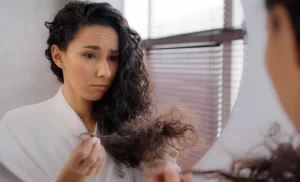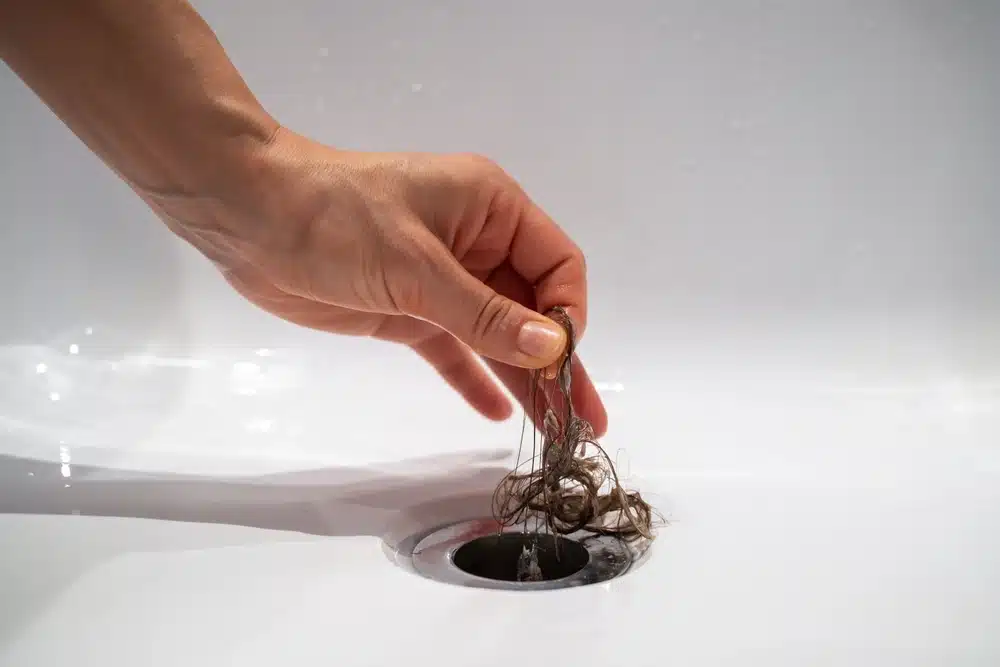Salt water can have both a positive and a negative impact on your locks. While it can provide plenty of texture and lovely-looking beach waves, the salt can also lead to dry, damaged, frizzy hair.
- Can Salt Water Improve Your Hair Health? Salt water typically doesn’t improve hair health and can actually cause more damage. However, the exfoliation properties can stimulate blood flow to the scalp, leading to healthier hair growth in some cases.
- What Does Salt Water Do to Your Hair? Salt water can give your hair a lot more texture, creating those beachy waves associated with swimming in the sea. It can also exfoliate the scalp. Too much salt water on the hair may cause damage, however, as salt water draws moisture out of the strands.
- How Do You Use Salt Water on the Hair? You can either mix salt with water and spritz it straight onto your locks, or you can simply go swimming in the sea!
- Can Salt Water Damage Your Hair? Yes, salt water can damage your hair as the salt can be very drying, leading to frizzy, tangled locks.
- How Do You Protect Your Hair While Swimming in the Sea? Wear a protective hairstyle and a swim cap when swimming in the sea. Also, when out of the ocean, rinse your hair thoroughly and use moisturising hair products to restore hydration.
People love trying all sorts of ingredients on their hair for different effects. One popular ingredient used for hair texture and body is salt water, but is salt water good for your hair? While many people love the natural waves that occur after spending time in the ocean, that doesn’t necessarily mean using salt water on the hair and scalp daily is the best addition to your hair care routine. In fact, there are some very real negative effects of exposing your hair to too much salt water.
What’s in Salt Water?
Of course, the two ingredients in salt water are simply salt and water. It’s also a good idea to understand precisely what is in sea salt, which includes these minerals:
- Magnesium
- Calcium
- Potassium
- Chloride
- Bicarbonate
The amount of each mineral present in the salt depends on what kind of salt it is. Sea salt has much larger granules than table result, and table salt has much more sodium per gram [1], which can produce slightly different effects on the hair.
How Salt Water Can Damage the Hair
When you put too much salt water on your hair or spend too much time in the ocean, you may notice that your hair isn’t as luscious as it once was. That’s because the salt draws out the moisture and natural oils in your hair and causes your hair’s cuticles to swell. As a result, you end up with dry and brittle strands; the hair can even become so dry that sea salt becomes one of the factors in hair loss. It will also be more difficult to brush through your hair after salt water exposure due to it being tangled.
Salt water causes even more damage to dyed hair, as it has already experienced damage (especially bleached hair), and saltwater exacerbates it. On top of that, frequent exposure to salt water will fade the hair dye, meaning you’ll lose your colour and need to top it up again too quickly.
The Benefits of Salt Water on the Hair
With how much damage salt water can cause, you might wonder if there are any benefits. Is salt water good for hair in any way? The answer is yes! While it shouldn’t be used as the sole ingredient in a hair care routine, some people enjoy some undeniable benefits.
- More Texture
The addition of the salt crystals in your hair gives the visual effect of textured hair that’s full of body. That’s what gives you those natural beach waves that so many people love. These beach waves create a soft, beautiful look that frames most faces nicely.
- The Anti-fungal Properties
For those with dandruff or a fungal infection on the scalp, salt water can help target and eliminate the infection.
- The Exfoliation
Salt water acts as a natural exfoliator. Scrubbed into the scalp, this can remove buildup and stimulate blood flow, resulting in healthier hair follicles (which help boost hair growth). It’s a good idea to rinse the salt water out after exfoliation to prevent salt crystals from forming.
- Less Grease
Those with greasy hair can attest to how difficult it is to keep those natural oils at bay. Salt water acts as a natural shampoo, stripping the hair of excessive oils and sebum, allowing you to enjoy non-greasy hair for longer.
How to Use Salt Water On Hair
If you have oily hair and want a little more texture, saltwater might work well for you. Here are the two best ways to apply saltwater to the hair.
1: Salt Hair Sprays
Salt hair sprays are undeniably the easiest way to get salty water on hair. All you need to do is take the bottle and spritz it through your hair, focusing more on the roots for extra body. You can put as much or as little in as you like! You can find plenty of salt hair sprays in shops (many of which contain other ingredients for extra protection), but you can also make your own easily at home with a spray bottle, salt, and water.
2: Swimming in the Sea
If you’re lucky to live by the coast, you can expose your hair to salt by swimming in the sea! Simply go for a swim and then enjoy the extra texture and body of your hair. It’s called “beach waves” for a reason.
Is Sea Water Good for Your Hair?
All salt comes from the sea, so all salt water can also be described as sea water. However, you might notice a different effect once you’ve come out of the ocean compared to using a salt water spray! That’s because there are different types of salts – some with larger grains and some with more impurities.
It’s important to note that swimming in the sea can also impact the hair through UV rays. One study showed the undeniably harmful effects of UVB radiation and UVA radiation on the hair, with UVB radiation causing hair protein loss and UVA changing hair colour. [2] Also, don’t forget that the UV rays can significantly damage the skin, with sun damage contributing to pigmentation, wrinkling, and blotchiness – it can even lead to skin cancer. [3] Using a good sunscreen is crucial whenever you’re in the sun.
Tips for Protecting Your Hair When Exposed to Salt Water
If you really want to enjoy the benefits of salt water hair, you’ll need to take precautions – there’s no denying how much it can damage the hair.
- Rinse Hair with Fresh Water Afterwards
If you’ve just come out of swimming in the sea, it’s always best to rinse your hair with fresh water – completely salt-free. Doing this will rinse some of the salt out, preventing it from forming crystals and potentially contributing to breakage. Keeping an additional bottle of water (aside from your drinking water) with you while on the beach is always useful.
- Use a Barrier Product
A barrier product like a hair mask or oil before entering the sea can help protect your hair from drying out. Even something as simple as rinsing your hair with fresh water beforehand can help if you don’t have a barrier product on hand.
- Wear a Hair Cap
A swim cap will prevent your hair from getting wet while swimming. When using the hair cap, you could even put a moisturising product on underneath for extra protection.
- Use Nourishing Hair Care Products
Your hair care routine plays a huge role in your hair’s hair and texture. If constantly exposed to salt water, adapt your hair care routine to include plenty of nourishing and highly moisturising products. High-quality hair masks can help, as can seed oils. Olive oil, argan oil, and coconut oil are relatively inexpensive and can make a an enormous difference in how much the hair gets damaged in the sea!
- Wear a Protective Hairstyle
Wear a protective hairstyle like braids or bun if you don’t have a hair cap. It won’t prevent 100% damage, but it will lessen the amount of salt water your hair gets exposed to.
Does Pool Water Have an Effect on the Hair?
Yes – much like salt water, chlorine can harm your hair’s health, as it strips the hair of its natural oils. As a result, you may experience dry hair and even potential breakage after swimming in a pool. That’s one of the reasons many professional swimmers always wear swim caps – as it helps prevent their hair from getting damaged and breaking off over time. Chlorine can also change the hair’s colour. If you have recently dyed your hair blonde, the chlorine can even turn it green.
Need Help With Hair Loss?
If you’re looking for ways to add more body to the hair, salt water might be a good method in a pinch. However, that’s only temporary and can lead to more damage. If you’re experiencing hair loss, salt water isn’t the way to go. Instead, you should focus on other hair restoration solutions.
Here at Harley Street Hair Clinic, we specialise in the state-of-the-art FUE hair transplant technique to help our patients grow a full head of hair. With our top surgeons and specialised equipment, you can restore your hair to its best, most voluminous form.
In Summary: Is Salt Water Good for Your Hair?
Hopefully, we’ve cleared up any questions, such as “What does salty water do to your hair?”. While you may experience positive results from using a bit of sea salt in the hair, such as added texture and tousled waves, it can also lead to visibly damaged hair and breakage.
There are plenty of other great ways to add volume to your hair without causing it excessive damage. However, if you love the effects of salt water, be sure to include moisturising hair care products in your routine to counter the extreme drying effects.
Sources:





